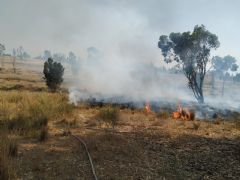Human Rights Voices
While the UN devotes its human rights operations to the demonization of the democratic state of Israel above all others and condemns the United States more often than the vast majority of non-democracies around the world, the voices of real victims around the world must be heard.
Palestinian Authority/Gaza, July 14, 2019
Gaza Kite Terror and Balloon Arson Attacks: 138 Incidents, 180 Acres Burnt
Original source
Since the return of the incendiary balloon arson attacks from Gaza at the start of April this year, KKL-JNF [Jewish National Fund] and Israeli Fire and Rescue Service firefighters found themselves fighting dozens of fires each day. With millions of children and youth out of school for their summer vacation, KKL-JNF surveyed the burnt areas in local forests to determine the degree of damage done to tourism sites. This information will enable KKL-JNF staff to prepare the region for visitors as soon as calm returns to the region.
KKL-JNF found that the damage wrought by this year's fires was much more limited compared to last year. This was thanks to the quick response of the firefighting teams and successful cooperation between all the different forces in the field. In addition, KKL-JNF found that the preventive measures taken in the forests over the past winter paid off by minimizing the spread of the fires. Preventive measures included removing pruned branches from the forest, cutting dry weeds and creating buffer zones between forested areas.
Local tourism and recreation sites did indeed suffer damage, which was likewise limited in scope with good chances for rehabilitation. For example, a fire at the Asaf Siboni scenic lookout near Kibbutz Nir Am caused relatively minimal damage, with mainly the surrounding vegetation affected.
The survey also found that since this recent wave of kite terror, the number of events increased significantly over the past few months. In April of this year, there were only nine fire events, while in June firefighters dealt with 82 events. As of July 5, there have been 138 fire incidents over an area of 180 acres in the region bordering on the Gaza Strip, 120 of which were in forests. The forests that suffered the most serious damage were the Be'eri and Kisufim forests. The regions of Nahal Hanoun, Shovalim, Nahal Habesor, Netivot, Shokeda, Sderot, Erez, G'varam and Yad Mordechai also sustained damage.
KKL-JNF World Chairman Daniel Atar noted, "KKL-JNF Southern Region workers are working around the clock to protect the Western Negev communities and forests. The challenges they are facing are extremely difficult, which is why I am pleased that people of their caliber have this task. I hope that now, with the children on summer vacation and the signed political agreements, the fires will subside and we will soon be able to go back to working for the benefit of the southern communities and Negev tourism."
"We didn't want to believe that we'd have to deal with incendiary kite terror this year too," said KKL-JNF Land Development Authority Director Yaron Ohayon. "However, prior preparation and the experience that KKL-JNF workers gained last summer prepared them for yet another season of fires and incendiary kites. In spite of the high number of incidents, we have been successful in keeping the fires small, thanks to gaining quick control of the flames and putting the fires out rapidly."

